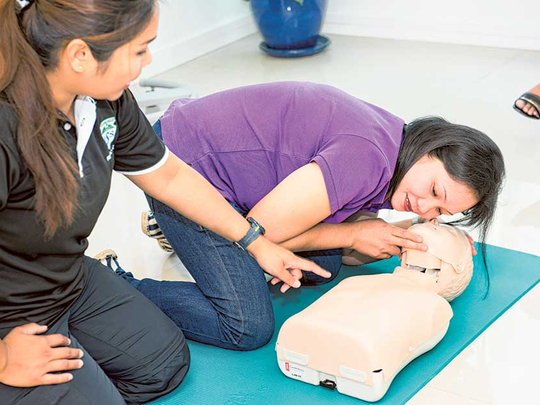
Abu Dhabi: When looking for childcare for their wards, parents always try their best to pick the safest alternative within their budget.
In the majority of cases, parents look for carers who have previous child-rearing experience through children of their own or having worked as a nanny for another family. But the importance of first aid training among caregivers is often ignored.
Most parents who spoke to Gulf News said they had not considered first aid certification when selecting their nannies and maids.
“I hired our Filipina maid from an agency to ensure she was legal. I looked for a candidate who was married and had children of her own as my wife and I felt that this would make her better qualified to handle my own two children,” Amir Sa’ad, an Egyptian sales manager, told Gulf News.
Sa’ad’s wife is a homemaker, so his children, aged two and eight, are not often left alone with the maid.
“She mainly helps my wife with the cleaning. And when she first joined us, we supervised her closely for the first three months and taught her to keep a close watch on the children,” he explained.
The 27-year-old maid is now well-trained in ensuring that the children are kept safe from risks like poisoning or burning.
Zaina Shedib, 29, a media executive from Germany and a mother-of-two, is currently at home with her daughters. She, too, has a maid to help around the house, but takes on most of the childcare duties herself.
Despite the lack of focus on first aid certification as a necessary childcare qualification, these parents do agree that a nanny with knowledge of basic medical care would be a safer guardian for their children.
“Before I go back to work next year, I might actually considering having our nanny trained in first aid. I wasn’t really aware of these courses before this, and the cost does not seem particularly steep for the valuable knowledge she will gain,” she added.
“I also think that the need for first aid qualifications depends on how long children are left alone with the help. If it is for a short while every now and then, such as when the children are asleep and parent step out to get some groceries, it may not be necessary to get training for the nanny,” Shedib said.
Sa’ad said he would only look at first aid training options if their maid appeared to be putting the children at risk.
“We never really considered it when we hired her, but she is very good with the children. So it seems somewhat unnecessary at the moment,” Sa’ad said.
According to Hana Al Zurba, a doctor and mother-of-three from Jordan, the responsibility of training nannies lies with the agencies that hire them out.
“That said, I would not mind getting my nanny enrolled in one myself. When I hired a nanny, I checked to see that she had some experience handling babies, and that I could communicate with her. But I did not consider how important it was for her to know what to do in case an emergency arises at home,” Al Zurba said.
Laila Mohammad believes the most important child-rearing skills come from previous experience.
“I usually do not leave my children alone at home with our maid, and only ask her to watch over them when I step out for a quick minute, like when I have to get some groceries. I also leave a phone with my 10-year-old daughter so that she can call me if there is an emergency, and I call her every half-hour to ensure that all is well,” the 30-year-old Emirati homemaker said.
Instead of training her Indonesian maid, Mohammad is actually considering getting first aid certification herself.
“Our house is located far away from where most of our other families live, and I worry that there will be no one to help my children in case one of them gets hurt. So, learning about first aid myself would be a good idea,” she said.








